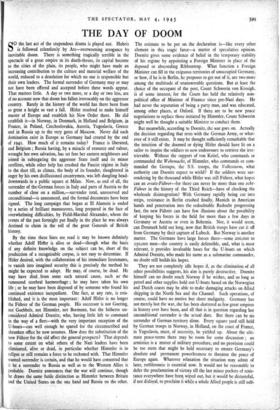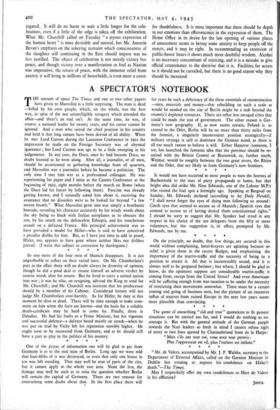THE DAY OF DOOM
SO the last act of the stupendous drama is played out. Hubris is followed relentlessly by Ate—overweening arrogance by inevitable doom. There is something tragically terrible in the spectacle of a great empire in its death-throes, its capital become as the cities of the plain, its people, who might have made an increasing contribution to the culture and material welfare of the world, reduced to a desolation for which no one is responsible but their own leaders. The formal surrender of Germany may or may not have been offered and accepted before these words appear. That matters little. A day or two more, or a day or two less, are of no account now that doom has fallen irrevocably on the aggressor country. Rarely in the history of the world has there been from so great a height so vast a fall. Hitler resolved to make himself master of Europe and establish his New Order there. He did establish it—in Norway, in Denmark, in Holland and Belgium, in France, in Poland, Czechoslovakia, Austria, Yugoslavia, Greece and in Russia up to the very gates of Moscow. Never did such domination exist in Europe as Germany had created by the end of 1941. How much of it remains today? France is liberated, and Belgium ; Russia having, by a miracle of resource and valour, wrought her own salvation, has set free her eastern neighbours and joined in subjugating the aggressor State itself and its minor satellites, while other help has crushed the Fascist regime in Italy to the dust till, as climax, the body of its founder, slaughtered in anger by his own disillusioned countrymen, was left dangling head- downwards in a public square at Milan. Now, as end of all, the surrender of the%German forces in Italy and parts of Austria to the number of close on a million,—surrender total, unreserved and unconditional—is announced, and the formal documents have been signed. The long campaign that began at El Alamein is ended by a series of brilliant manoeuvres, long prepared in the face of overwhelming difficulties, by Field-Marshal Alexander, whom the events of the past fortnight put finally in the place he was always destined to claim in the roll of the great Generals of British history.
By the time these lines are read it may be known definitely whether Adolf Hitter is alive or dead—though what the basis of any definite knowledge on the subject can be, short of the production of a recognisable corpse, is not easy to determine. If Hitler desired, with the collaboration of his immediate lieutenants, to vanish into imagined security this is precisely the method he might be expected to adopt. He may, of course, be dead. He may have died, from some such natural cause, such as the rumoured cerebral haemorrhage ; he may have taken his own life ; or he may have been disposed of by someone who found his continued existence inexpedient. One fact, at any rate, is esta- blished, and it is the most important: Adolf Hitler is no longer the Fiihrer of the German people. His successor is not Goering, not Goebbels, not Himmler, not Borman, but the hitherto un- considered Admiral Doenitz, who, having little left to command in the way of a fleet—with the very important exception of the U-boats--can well enough be spared for the circumscribed and shrunken office he now assumes. How does the substitution of the new Fiihrer for the old affect the general prospects? That depends to some extent on whit others of the Nazi leaders have been eliminated, alive or dead, in particular whether Himmler is in eclipse or still remains a force to be reckoned with. That Himmler wanted surrender is certain, and that he would have consented that it be a surrender to Russia as well as to the Western Allies is probable. Doenitz announces that the war will continue, though he thaws the same futile distinction as Himmler between Britain and the United States on the one hand and Russia on the other. The estimate to be put on the declaration is—like every other element in this tragic farce—a matter of speculative opinion.
Doenitz gives some evidence of belief in the temporary stability of his regime by appointing a Foreign Minister in place of the deposed or absconding Ribbentrop. What function a Foreign Minister can fill in the exiguous territories of unoccupied Germany, or how, if he is in Berlin, he proposes to get out of it, are two more among the multitude of unanswerable questions. But at least the choice of the occupant of the post, Count Schwerin von Krosigk, is of some interest, for the Count has held the relatively non- political office of Minister of Finance since pre-Nazi days. He had never the reputation of being a party man, and was educated, among other places, at Oxford. If there are to be new peace negotiations to replace those initiated by Himmler, Count Schwerin might well be thought a suitable Minister to conduct them.
But meanwhile, according to Doenitz, the war goes on. Actually the decision regarding that rests with the German Army, or what- ever of it still exists. It may be thought sufficiently remarkable that the intuition of the doomed or dying Hitler should have lit on a sailor to inspire the soldiers to new endeavours to retrieve the irre- trievable. Without the support of von Keitel, who commands or commanded the Wehrmacht, of Himmler, who commands or com- manded the Gestapo, the S.S. troops, the Volkssturm, what authority can Doenitz expect to wield? If the soldiers were sur- rendering by the thousand while Hitler was still Fiihrer, what hopes can an ersatz-Fiihrer—for there can never be more than one echt- Fiihrer in the history of the Third Reich—have of checking the wholesale disintegration? With Germany rapidly being cut into strips, resistance in Berlin crushed finally, Munich in American hands and penetration into the redoubtable Redoubt progressing fast, the new Fiihrer can have few illusions about the possibility of keeping his forces in the field for more than a few days in Germany or Austria or even in Bohemia. Nor, it would seem, can Denmark hold out long, now that British troops have cut it off from Germany by their capture of Lubeck. But Norway is another matter. The Germans have large forces there—some 200,000 to 250,000 men—the country is easily defensible, and, what is most relevant, it provides invaluable bases for the U-boats on which Admiral Doenitz, who made his name as a submarine commander, no doubt still builds his hopes.
They are not completely idle hopes if, as the elimination of all other possibilities suggests, his aim is purely destructive. Doenitz himself can no doubt reach Norway if he wishes, and so long as petrol and other supplies hold out U-boats based on the Norwegian and Dutch coasts may be able to make damaging attacks on Allied shipping in the North Sea and the Channel. Such operations, of course, could have no motive but sheer malignity. Germany has not merely lost the war, she has been shattered as few great empires in history ever have been, and all that is in question regarding her unconditional surrender is the actual date. But there can be no surrender of German territory alone. Every square yard still held by German troops in Norway, in Holland, on the coast of France, in Yugoslavia, must, of necessity, be yielded up. About the ulti- mate peace-terms there may be room for some discussion ; an armistice is a matter of military procedure, and no provision could be too stern that might be held necessary to ensure Germany's absolute and permanent powerlessness to threaten the peace of Europe again. Whatever relaxation the situation may admit of later, ruthlessness is essential now. It would not be reasonable to defer the proclamation of victory till the last minor pockets of resis- tance everywhere have been wiped out, but it would be distasteful, if not disloyal, to proclaim it while a whole Allied people is still sub'- jugated. It will do no harm to wait a little longer for the cele- brations, even if a little of the edge is taken off the exhilaration. What Mr. Churchill called on Tuesday " a joyous expression of the human heart " is most desirable and natural, but Mr. Aneurin Bevan's emphasis on the sobering restraint which consciousness of the slaughter still continuing in the East should impose was no less justified. The object of celebration is not merely victory but peace, and though victory over a manifestation so foul as Nazism was imperative, the return of peace, with the immense relief from anxiety it will bring to millions of households, is even more a cause for thankfulness. It is more important that there should be depth in our emotions than effervescence in the expression of them. The Home Office in its desire for the late opening of various places of amusement seems to betray some anxiety to keep people off the streets, and it may be right. In recommending an extension of public-house hours it shows much more doubtful wisdom. Alcohol is no necessary concomitant of rejoicing, and it is a mistake to give official countenance to the doctrine that it is. Facilities for access to it should not be curtailed, but there is no good reason why they should be increased



























 Previous page
Previous page